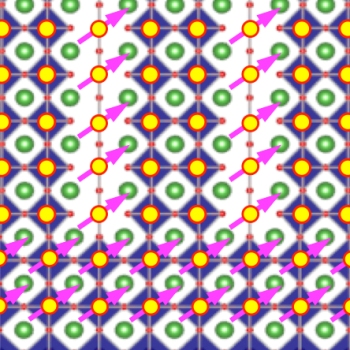An Oak Ridge National Laboratory research team has successfully grown epitaxial thin films with minimal defects. These films are used in fabrication of semiconductors and in nanotechnology applications. The researchers have discovered an elusive strain relaxation phenomenon in cobaltites which may lead to better energy-related materials, fuel cells, and magnetic sensors.

A schematic of a regular atomic array of ferromagnetic nano-domains formed due to an unconventional strain relaxation
Ho Nyung Lee of the Department of Energy lab's Materials Science and Technology Division, who led the team, suggested that the discovery may change the traditional notion that allowing strain that is inherent during epitaxial thin film formation compulsorily involves structural defects. The researchers discovered that cobaltite and other such materials formed atomic patterns that were well ordered, structurally. These patterns were able to modify their magnetic properties and were also able to reduce their mismatch in size with the crystalline substrate.
Creation of epitaxial thin films involves growth of crystal layers of one material over another. During this process, the crystalline structures must align with each other. Defects occur during the process of film growth and these can severely affect the performance of the material. Difficulties exist in growing the film with the least amount of defects. The researchers were able to observe lanthanum cobaltite’s atomically ordered lattice structure in thin-film form but not in crystal form.
The researchers utilized X-ray, optical spectroscopy and scanning transmission electron microscopy to observe the unconventional strain relaxation behavior that led to production of stripe-like lattice patterns. This produces a material with magnetic properties that allows it to be used for batteries, sensors, surface catalysts and ionic conductors. The finding raises the possibility of using the material for tuning magnetism artificially.
The study has been published in the journal Nano Letters.
Source: http://www.ornl.gov/
Disclaimer: The views expressed here are those of the author expressed in their private capacity and do not necessarily represent the views of AZoM.com Limited T/A AZoNetwork the owner and operator of this website. This disclaimer forms part of the Terms and conditions of use of this website.